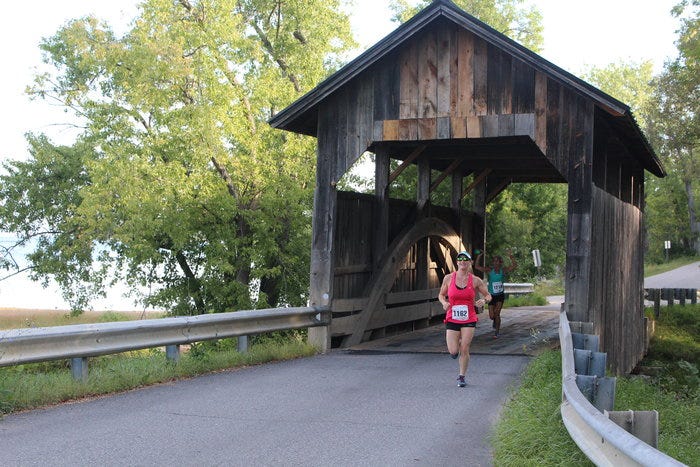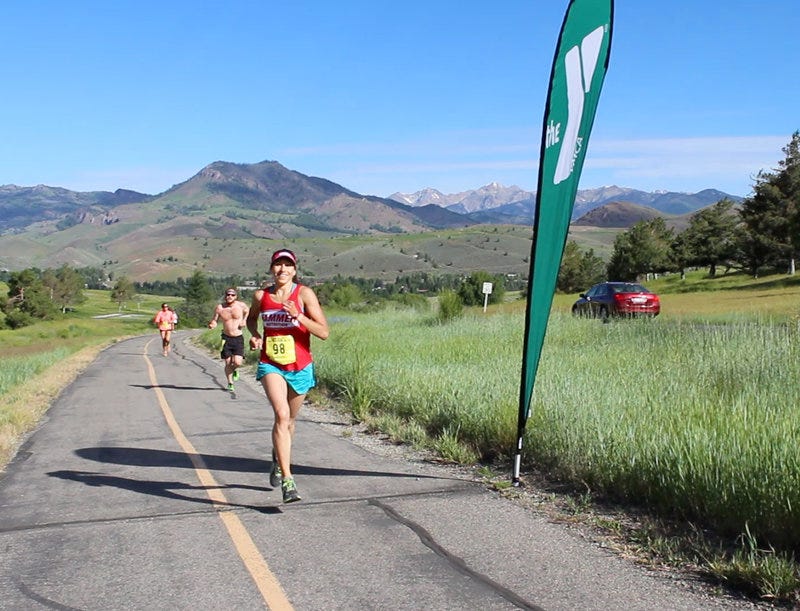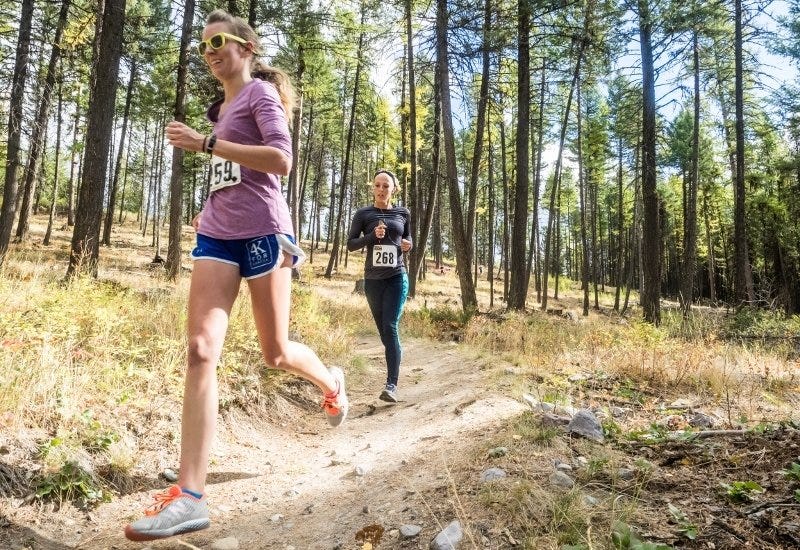We all need an antelope to chase
Plus: 10 scenic covered bridge half marathons

The answer, as the author of the 2002 book “Why We Run” writes in the sentence immediately following the quotation above, is that in life, it seems we humans need antelopes to chase. Without them, “we become as a lapdog is to a wolf.”
And while it’s nice to have a sit on the porch and rest for a while like a lapdog, sooner or later we all feel the need stirring in us to be a wolf again — “to seek, to strive, to find, and not to yield,” as the great Victorian poet Tennyson reminds us. To seek out a goal we’re not sure we can achieve and try to reach for it.
I felt that need when I first started running, when I was in my mid-twenties. Starting with the Peachtree Road Race 10K here in Atlanta, I jumped next up to running a 26.2-mile marathon — maybe a little ambitious, but hey, I was 25 at the time! — and since then I’ve added a string of half marathons on to those.
And now, after a long layoff from racing thanks to the birth of my now almost-5-year-old son, I’m jumping back in with some local races first this fall, and hopefully some travel races too later on.
I’ve been running most weekends lately with a group I used to run with years ago, and feeling my own pace running some longer distances, I can definitely tell a difference between now and my younger self.
So, while the lapdog in me most definitely enjoys resting, there’s still a wolf inside that wants to be a better version of myself — to feel what it felt like when I was running lots of miles every week, to be able to run those long distances and still have a spring in my step, to feel that energy that running can give you.
When I feel like I can’t do it — and I have to admit, that little voice in the back of my mind can be awfully persuasive sometimes — I think of the great conversations I’ve had with you guys over these past three years via email.
Especially conversations like this one, from a woman who calls herself “Joyce, from Kentucky,” and shared her story in a reply to last week’s newsletter:
“This is the first time that I have responded to the many chats that I have read on this awesome site. I am 75 years young and love to be on the road. I do not run at the pace that I did when I started races at the age of 38, but the pleasure (physically and psychologically) is still a part of my life.
I have been blessed to meet [a friend] who encouraged me participate in the Cincinnati Queen Bee Mini Marathon, and to join the National Black Marathoners Association. I plan to run/jog/walk (SMILES!!!) the half marathons in Baltimore and Atlantic City in October... I might not receive any age group awards, but I shall finish and receive that all precious finisher's medal!!!”
How can I stop when readers like Joyce keep going? Stories like that are such an inspiration to me, and I hope to you too.
A place to chat?
With that in mind, I wanted to share something new I’d like to try with you all. Last week, I had a conversation with Hollie Sick, one of our writers who’s also a highly experienced half marathoner.
Among the things we talked about are the challenges that races are facing today — largely because there are so many different kinds of runners.
For example, at a race like September’s Rock ‘n’ Roll Philadelphia Half, you’ll have lots of first-time runners who simply want to finish as well as plenty of runners who’ve done lots of races, and are going for a PR. You’ll have loads of local runners, but also quite a few people who’ve traveled there just to run the race.
The question is, how do you give all those different runners an experience they’ll like? Different runners have different needs, and it’s not possible to meet them all.
To that end, what I’d like to do is to take the community we’re developing here and build on it with something like a Facebook group or a Slack channel — I’d love to hear your questions, ideas and thoughts.
Do you have a preference between the two — is a Facebook group easier, or do you prefer Slack? Or another channel I haven’t even thought of?
In the meantime, hope you’re having a great week and getting going with your training for fall races — as always, keep in touch and let me know how things are going.
Your friend,
— Terrell
Get more from your subscription
When you sign up for a paid subscription to The Half Marathoner, you help us stay ad-free (yay!) and you get two extra weekly emails from us, with exclusive race discounts and deeper dives into the things we talk about here.
Interested? Sign up here.
10 Scenic Covered Bridge Half Marathons

Sun Valley Half Marathon

Set for September 2018 — details here.
Les Cayes Half Marathon

Set for April 2019 — details here.
Whitefish Trail Legacy Run Half Marathon

Set for October 2018 — details here.
San Diego Beach & Bay Half Marathon

Set for April 2019 — details here.
In Case You Missed It

Who doesn’t love visiting a college town, especially if it’s their alma mater? From the University of Georgia campus in Athens, Ga., to the roads and pathways of the University of California in Los Angeles, here are some really beautiful courses to run this fall and winter (and into next year).
Why Running Slow Can Eventually Help You Run Faster
“The last time my husband filmed me as I crossed the finish at a race, I thought he was experimenting with the slo-mo feature on his iPhone. Those people who look so good when they run? I’m not one of those people.”
— While this Washington Post piece starts off with a funny story by the writer, it shifts quickly into the science of why slow running really does work: because it helps your body stay in the mode of burning energy using your aerobic system, vs. your anaerobic system. One 41-year-old runner who stuck with slow runs throughout his training, the author adds, was able to cut his marathon time from 5 hours and 51 minutes down to 3 hours and 57 minutes.
Forget ‘Wellness’ and Hotel Gyms — a Run Outdoors Is One of Travel’s Greatest Pleasures
“Holidays with a bit of competition thrown in? Mud runs, jogging courses, massage therapies, ball games? All in one campsite, apparently. It’s glamping with a fitness imperative and possibly without the glam bit. Organised sport en masse? I believe the Boy Scouts and the Communist Party were keen on similar things, with slightly fewer healing crystals on offer. Me, I like my punishment in private.”
— Nothing earth-shattering in this piece from the London Telegraph newspaper, just a wonderful reflection on the cacophony of different exercise and fitness routines there are out there, and the stillness and solitude that running in a foreign place provides you. (And helps to make that place a little less foreign too.)
The Automatic Hobbyjogger Detection Machine
“Studies have generally found that inexperienced runners get injured a lot more than experienced ones despite running less, and they tend to get injured in different places... So knowing whether your running form is getting more ‘competitive’ or more ‘recreational’ might theoretically give you some hints about whether your training is working and where you might be most vulnerable to injury.”
— You might read this piece, look at me and say “so what?” After all, it’s about a study in which scientists used an accelerometer device to measure the running strides of 41 people, and then fed the data into a computer to study it. I’m fascinated with the ways in which machine learning is changing our world, and while this is a small way, it does show how technology might open new doors even for us “hobbyjogger” recreational runners.
6 Science-Backed Ways Running Improves Your Health
“You’ve probably heard the saying, ‘Exercise is medicine.’ Well, it’s not just a saying; it’s the truth. Scientific research proves that regular exercise (150 minutes per week, which is about 30 minutes, five times per week) — and running in particular — has health benefits that extend well beyond any pill a doctor could prescribe.”
— While plenty of this won’t be new to you guys, there were some surprising things that jumped out at me as I read this Runner’s World story. While I knew, of course, that running could help me feel better physically and mentally in a general sense, I didn’t know about the research that it also reduce your risk of cancer. Really interesting bits here about the sport we all love.


Really interested to hear what you guys think what the right channel for chat is -- Facebook Group, Slack, or something else? I lean toward a Facebook group b/c I figure everyone's already on FB, but I realize there may be not a small number of you with Facebook fatigue. If it were totally up to me, I'd vote for Slack -- the community features are fantastic and their smartphone app is incredibly easy to use. But I know that also means asking you to create an account and download their app, which may or may not be something you're up for. Interested to hear your $0.02.